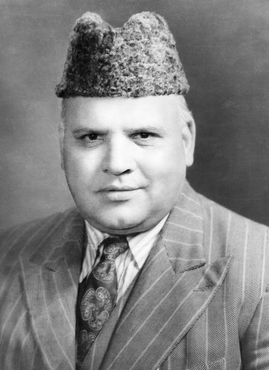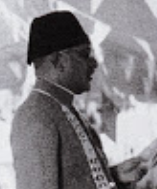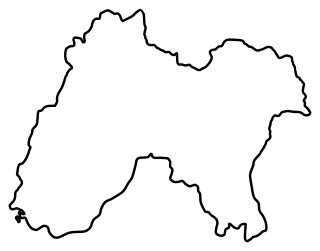
The Pakistan Muslim League (N) (PML(N) or PML-N; Urdu: پاکستان مسلم لیگ (ن)) is a centre-right, conservative liberal political party in Pakistan. It is currently the third-largest party in the Senate and the largest in the National Assembly. The party was founded in 1993, when a number of prominent conservative politicians in the country joined hands after the dissolution of Islamic Democratic Alliance, under the leadership of former Prime Minister Nawaz Sharif. The party's platform is generally conservative, which involves supporting free markets, deregulation, lower taxes and private ownership. Although the party historically supported social conservatism, in recent years, the party's political ideology and platform has become more liberal on social and cultural issues; however, members have been accused of using Islamist populist rhetoric. Alongside the Pakistan Tehreek-e-Insaf (PTI) and Pakistan People's Party (PPP), it is one of the three major political parties of the country.

The Pakistan Muslim League Urdu: پاکستان مسلم لیگ (ق); Pākistān Muslim Līg (Qāf), Acronyms: PML(Q), PML-Q, PMLQ, "Q League" is a political party in Pakistan. As of the 2024 parliamentary election, it has a representation of five seats. It previously served as an ally of former prime minister Raja Pervez Ashraf's government, and led a joint election campaign in 2013 alongside Pakistan Peoples Party (PPP) in Punjab and Balochistan provinces against its rival Pakistan Muslim League (N), a fiscally conservative and centre-right force.

Sir Khawaja Nazimuddin was a Pakistani politician and statesman who served as the second governor-general of Pakistan from 1948 to 1951, and later as the second prime minister of Pakistan from 1951 to 1953.

Ibrahim Ismail Chundrigar was a Pakistani politician who served as the sixth prime minister of Pakistan, appointed in this capacity on 17 October 1957. He resigned due to a vote of no confidence on 11 December 1957, against him.

Abul Kasem Fazlul Huq, popularly known as Sher-e-Bangla, was a Bengali lawyer and politician who presented the Lahore Resolution which had the objective of creating an independent Pakistan. He also served as the first and longest Prime Minister of Bengal during the British Raj.

The Pakistan Muslim League (Functional) (Urdu: پاکستان مسلم لیگ (ف), acronym: PMLF, PML-F, PML (F)) is a nationalist and pro-Hurs clan political party in Pakistan. It is one of the breakaway groups of Pakistan Muslim League. The letter 'F' in its name stands for functional. It is primarily associated with the Sindhi religious leader Pir Pagara. It was formed in 1985 when the Pakistani establishment decided to make Muhammad Khan Junejo the president of united PML. In response, Pir Pagara Syed Shah Mardan Shah-II parted ways with the mother league and formed his own party.

Mian Iftikharuddin was a Pakistani politician, activist of the Indian National Congress, who later joined the All-India Muslim League and worked for the cause of Pakistan under the leadership of Muhammad Ali Jinnah. He was known for his left-wing politics and briefly served as the Provincial Minister for Rehabiilitation of Refugees in Punjab.

Muhamad Yusuf Khan Khattak was a Pakistani politician, left-wing intellectual, lawyer, and noted Pakistan Movement activist from Khyber Pakhtunkhwa.

Khan Abdul Qayyum Khan Kashmiri was a major figure in British Indian and later Pakistani politics, in particular in the North-West Frontier Province, where he served as the Chief Minister from 23 August 1947 to 23 April 1953. He also served as the Interior Minister of Pakistan from 1972 to 1977.

General elections were held in Pakistan on 7 December 1970 to elect members of the National Assembly. They were the first direct general elections since the independence of Pakistan and ultimately the only ones held prior to the independence of Bangladesh. Voting took place in 300 general constituencies, of which 162 were in East Pakistan and 138 in West Pakistan. A further thirteen seats were reserved for women, who were to be elected by members of the National Assembly.
The Pakistan Muslim League (Jinnah) (Urdu: پاکستان مسلم لیگ جناح) was a political party in Pakistan. It was one of the factions of the original Pakistan Muslim League, named after the founder of Pakistan Muhammad Ali Jinnah.
The Krishak Sramik Party was a major anti-feudal political party in the British Indian province of Bengal and later in the Dominion of Pakistan's East Bengal and East Pakistan provinces. It was founded in 1929 as the Nikhil Banga Praja Samiti to represent the interests of tenant farmers in Bengal's landed gentry estates. Sir Abdur Rahim was its first leader. A. K. Fazlul Huq was elected leader in 1935 when the former was appointed as the president of the Central Legislative Assembly of India.

When the All-India Muslim League was founded at Dacca, on 30 December 1906 at the occasion of the annual All India Muhammadan Educational Conference, It was participated by the Muslim leaders from Punjab, i.e., Sir Mian Muhammad Shafi, Mian Fazl-i-Hussain, Abdul Aziz, Khawaja Yusuf Shah and Sh. Ghulam Sadiq. Earlier Mian Muhammad Shafi organised a Muslim Association in early 1906, but when the All-India Muslim League was formed, he established its powerful branch in the Punjab of which he became the general secretary. Shah Din was elected as its first president. This branch, organised in November 1907, was known as the Punjab Provincial Muslim League.

The Awami League was a Pakistani political party founded by Huseyn Shaheed Suhrawardy in February 1950. Pir of Manki Sharif and Khan Ghulam Mohammad Khan from the North-West Frontier Province (NWFP) joined it soon afterwards.

Nawab Iftikhar Hussain Khan of Mamdot was a Pakistani politician and an advocate of the Pakistan Movement in British India. After Pakistan's Independence, he served as the 1st Chief Minister of West Punjab and later as the Governor of Sindh.

The Bengal Provincial Muslim League (BPML) was the branch of the All India Muslim League in the British Indian province of Bengal. It was established in Dhaka on 2 March 1912. Its official language was Bengali. The party played an important role in the Bengal Legislative Council and in the Bengal Legislative Assembly, where two of the Prime Ministers of Bengal were from the party. It was vital to the creation of the Dominion of Pakistan, particularly after its election victory in 1946.

Elections to the Punjab Provincial Assembly were held in January 1946 as part of the 1946 Indian provincial elections.
The Combined Opposition Parties (COP) was a Pakistani coalition of 6-13 political parties founded in 1965, to run in the 1965 presidential, and general election against field marshal Ayub Khan and his authoritarian regime.
Provincial Assembly elections were held in Dominion of Pakistan in 1951 to elect all 192 members of the Provincial Assembly of West Punjab along with other provincial election in North-West Frontier Province. It was Pakistan's first provincial assembly election. Pakistan Muslim League won the election, and defeated the JAML coalition of the Jinnah Muslim League and All-Pakistan Awami Muslim League.
Provincial Assembly elections were held in the North-West Frontier Province of the Dominion of Pakistan in 1951 to elect all 85 members of the Provincial Assembly, alongside provincial elections in West Punjab. It was Pakistan's first provincial assembly election. The Muslim League won the election, defeating the Jinnah Awami Muslim League coalition of the Jinnah Muslim League and All-Pakistan Awami Muslim League.














